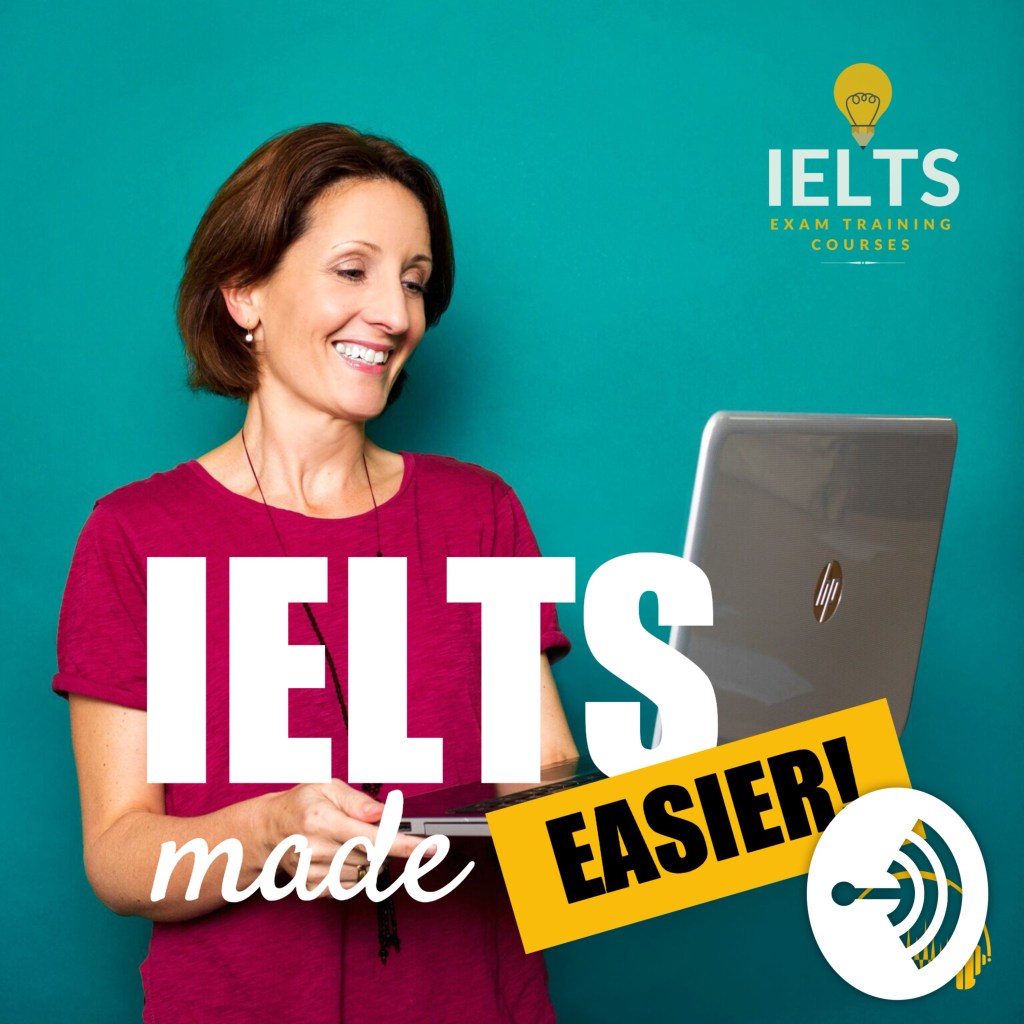IELTS Practice
This lesson is is about the IELTS. It is part of a complete and free upper-intermediate (B2) level English course. You can register free for this course here. Thos lesson is part of a series of lessons about exam preparation. If you are interested in other assessments, you can find information about the First Certificate in English exam and the Duolingo English Test by following the links.

What is the IELTS?
The International English Language Testing System, known as IELTS is an English level test that is accepted by companies, schools and universities in English-speaking countries. The IELTS exam is provided and operated by Cambridge Assessment English at the University of Cambridge.
How is the IELTS scored?
The test provides a result as a mark out of 10. There is no absolute pass or fail, like in the First Certificate or Advanced English Exams. Although Cambridge University describes the IELTS exam as the “World’s most trusted English test” it has recently seen competition from the Duolingo English Test. One of the main differences is that the DET uses artificial intelligence to asses students’ abilities, while the IELTS uses human interviewers, or as it calls them, interlocutors. Other big differences between the tests are that the Duolingo test is considerably cheaper and quicker. However, the DET has seen problems with students cheating, which have damaged its credibility.
IELTS bands
IELTS scores reflect users’ ability. The table below shows what each band means. (Descriptions based on the official IELTS guide here)
The person can understand and express basic ideas in familiar situations, but there are often difficulties in communication.
| 9 | The candidate is highly proficient in English, demonstrating excellent language skills and a thorough understanding of the subject matter. |
| 8 | The test taker has a strong grasp of the language and can use it effectively. They may make occasional mistakes, especially in unfamiliar situations, but overall they can understand and express complex ideas well. |
| 7 | The candidate is quite proficient in the language, but may make some mistakes and misunderstand certain situations. They handle complex language well and have a good understanding of detailed reasoning. |
| 6 | The person being tested understands the language pretty well, but there are a few mistakes and misunderstandings. They can use and understand somewhat complex language, especially in situations they are familiar with. |
| 5 | The candidate understands most situations but may have some difficulty with language proficiency. They can communicate in their field but may make errors. |
| 4 | The person being tested has some knowledge in simple situations. However, they may struggle with understanding and expressing themselves. |
| 3 | The candidate conveys and understands only general meaning in very familiar situations. There are frequent breakdowns in communication. |
| 2 | The test taker has great difficulty understanding spoken and written English. |
| 1 | The candidate has no ability to use the language except a few isolated words. |
| 0 | The test taker did not answer the questions. |
How do Students Take the test?
Candidates have to take the IELTS test at one of the more than 4000 official test centres in more than 140 countries around the world. To find your nearest test centre, check the official IELTS page.
The test has two varieties: academic and general, with each having its own focus and media.
Both varieties of the IELTS exam have the same components: listening, reading, speaking and writing. Students must undertake these parts of the test in a strictly limited time.
In this lesson you will be able to practise the various aspects of the exam with simulated materials.
How to Prepare for the IELTS
There are various ways to prepare for the IELTS. candidates can prepare alone, with self-study courses and book or with a tutor. Many schools and institutions offer specific IELTS preparation courses.
Here is our selection of the best resources to to help you prepare for the test. Onlearn may receive compensation for the use of our recommendations. However, we select materials and affiliates based on quality, not compensation.
Books
The Official Cambridge Guide to IELTS

The official Cambridge books provide plenty of practice for all aspects of the exam, with example practice papers for each part.
The Official Cambridge Guide to IELTS is a comprehensive and authoritative resource for IELTS exam preparation. It is suitable for students studying independently at all levels and covers both the Academic and General Training modules.
The guide includes language and skills development, as well as test-taking strategies to help students achieve their desired band-score. It also provides eight practice tests to ensure students are familiar with the exam format and can approach it with confidence. The DVD-ROM accompanying the guide includes videos of the Speaking test and all Listening material in MP3 format. The Official Cambridge Guide to IELTS App is also available for downloading the materials.
IELTS Trainer

The Cambridge IELTS Trainer provides detailed guidance and practice materials for all four sections of the test: Listening, Reading, Writing, and Speaking. With a focus on exam strategies and tips, the Cambridge IELTS Trainer offers accurate and authentic test questions to familiarise test-takers with the format and difficulty level of the actual exam. Whether you are taking the test for academic or general purposes, this trainer is a valuable tool to improve your language skills and increase your chances of achieving a high score.
The IELTS Trainer includes six practice tests with expert guidance and exam tips for success. The first two tests have step-by-step advice, while the remaining four tests simulate real exam conditions. Additional practice activities target common challenges. The answer key provides explanations, transcripts of all the audio, and model writing answers. The Audio CDs contain all the necessary audio for the Listening tests.
Tutors

If you are looking for direct tuition, we can recommend Fiona Wattam. Fiona is an IELTS expert who has more than 30 years experience in teaching for institutions like the British Council and Universities like the University of Essex. She is an ex-IELTS examiner, so knows exactly what you have to do to get the scores that you need!
Fiona has prepared an enormous amount of resources to help students with preparation for every aspect of the test. Fiona’s course will help you to feel confident and prepared for the examination.
You can find more information on her website here.
If you want to read more about the IELTS exam, you can follow the link to the Wikipedia entry, or the official IELTS page.

